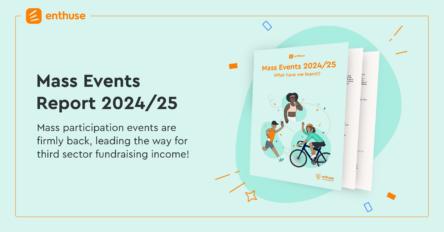
More than a third (37%) of UK donors can’t remember the name of the charity they most recently gave to online according to our new research. You can download it here.
The report is called Donor Pulse, and we’ll be talking to donors every quarter to get their views on fundraising, donating and charities in general. This first edition looks at the impact of Covid on donor behaviour.
Generation Generosity
Surprisingly the research shows Gen Z (18-24 year olds) were the most generous with 84% making a donation during lockdown. Though they were also least likely to remember who they donated to online. 56% were unable to recollect the charity’s name.
As a whole during lockdown, 59% of the public made a donation to charity. And just under a third (32%) gave to multiple charities. This was reflected in the public’s view of charities with a net change of 24% feeling more positively towards them.
Future feelings
This positive feeling was also shown in the inclination for future giving. 12% of respondents said they were more likely to donate in the next three months. This rose to 50% for 18-24 year olds.
Part of the reason behind this may be the government’s approach to helping the sector and the level of financial support offered to a range of causes. Two in five people stated the reason they were likely to give more was down to helping organisations that they felt had not been supported by the government.
Who are people donating to?
The pandemic has also had an impact on who supporters are giving to. While NHS Together received considerable donations with one in three stating they had given to public health charities, there were other success stories too.
Just under one in five said they had donated to food banks and homelessness charities. One in eight said they had given to local causes. Looking forward 22% said in future they would be more likely to donate to charities supporting local or community causes. This presents an opportunity for smaller local charities and national charities should consider how they communicate their local outcomes.
One area facing challenges is overseas appeals. While over lockdown, 1 in 10 people made a donation to international charities, Covid seems to have negatively impacted the willingness to give with a negative net position of -8% in willingness to donate in future, as people focus closer to home.
The shift to digital fundraising
There is no doubt that the pandemic has also rapidly increased the need for charities to have digital fundraising capabilities. The research found 79% of Gen Z who donated during lockdown, did so online. This isn’t limited to a younger audience, as similarly 44% of donations during lockdown by 65-80-year olds were digital.
56% of 18-24-year olds can’t remember the name of the charity they donated to online over lockdown. 25-54 year olds didn’t fare much better with 40% unable to recall the name. Only 55-64-year olds (67%) and 65-80 year olds (80%) showed strong recall.
“The inability of a third of donors to remember the name of the charity they last donated to presents a significant issue for the third sector. In part at least this seems to be down to the use of dominant online consumer giving platforms which put their brand ahead of the charities, with about half of digital donations going via these third parties. With uncertain times ahead, charities have to look at how they put their brand front and centre of fundraising.
Chester Mojay-Sinclare, Enthuse Founder and CEO
A virtual way forward?
With speculation that the government may need to introduce more restrictions again, virtual events will be really important for fundraising. Our study found that more than one in 10 people (12%) used lockdown to try out a virtual fundraiser. Nearly half (47%) said they would be interested in taking part in one in the future.
The top reason cited by more than a quarter (27%) of participants for taking part was the ability to connect with people they couldn’t see right now. Charities should consider this when planning future events. Hybrid activities mixing physical and virtual events could help to connect their supporters with friends.
You can read more about the report on UK fundraising.









